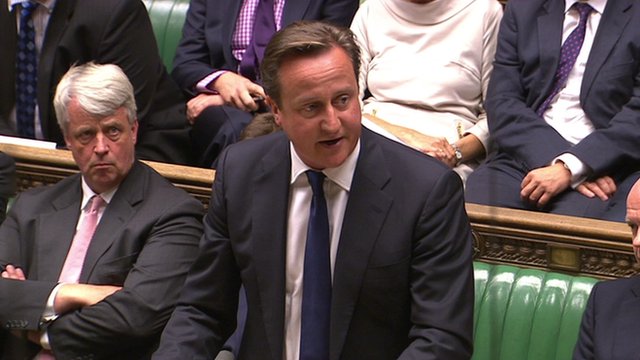UK MPs vote against Syria Military action
 British MPs have rejected possible UK military action against Syrian President Bashar al-Assad's government to deter the use of chemical weapons.
British MPs have rejected possible UK military action against Syrian President Bashar al-Assad's government to deter the use of chemical weapons.
Advertisement
A government motion was defeated by 285 to 272, a majority of 13 votes.
PM David Cameron said "the government will act accordingly", effectively ruling out London's involvement in any US-led strikes against Damascus.
The US said it would "continue to consult" with London, "one of our closest allies and friends".
"President Obama's decision-making will be guided by what is in the best interests of the United States," a White House statement said.
It added that Mr Obama "believes that there are core interests at stake for the United States and that countries who violate international norms regarding chemical weapons need to be held accountable".
Obama administration officials on Thursday told a group of US lawmakers in a conference call that "it is beyond a doubt that chemical weapons were used, and used intentionally by the Assad regime," said Eliot Engel, the senior Democratic member on the House Foreign Affairs Committee.
Mr Engel said the officials cited evidence including "intercepted communications from high-level Syrian officials".
They also said they they had seen personnel being moved around Damascus that indicated "it was ready for something big like a chemical attack", he added.
PM 'disappointed'
After the vote in London, opposition Labour leader Ed Miliband said the result meant military action was "off the agenda", and added that MPs had reacted against the prime minister's "cavalier and reckless" leadership.
Thirty Conservative and nine Liberal Democrat MPs voted against the government's motion.
The defeat comes as a potential blow to the authority of Mr Cameron, who had already watered down a government motion proposing military action, in response to Labour's demands for more evidence of President Assad's guilt.
The prime minister has now lost control of his own foreign and defence policy, and as a result he will cut a diminished figure on the international stage, the BBC's political editor Nick Robinson said.
He added that some strong advocates of the transatlantic relationship are worried that America may now question the value and reliability of Britain as an ally.
During the debate, Labour had seen its own amendment - calling for "compelling" evidence that the regime was responsible for chemical attacks - rejected by MPs by 114 votes.
But, unexpectedly, MPs also rejected the government's motion in support of military action in Syria if it was supported by evidence from United Nations weapons inspectors, who are investigating the allegations of a chemical weapons attack last week.
At least 355 people are reported to have died in the incident, in the Ghouta area on the outskirts of the capital, Damascus, on 21 August.
The US and UK say the Assad government was responsible. Damascus blames the attacks on rebels.
The UN experts are due to finish their work on Friday and give their preliminary findings to UN Secretary General Ban Ki-moon at the weekend.
Shortly after the vote in London, Defence Secretary Philip Hammond confirmed to the BBC's Newsnight programme that Britain would not be involved in any military action against the Assad government.
But he said he expected "that the US and other countries will continue to look at responses to the chemical attack".
"They will be disappointed that Britain will not be involved. I don't expect that the lack of British participation will stop any action."
He said he and the prime minister were "disappointed" with the result of the Commons vote which he said would harm Britain's relationship with Washington.
"It's certainly going to place some strain on the special relationship.
"The Americans understand the Parliamentary process. Perhaps they have been surprised by the scale of opposition."
Iraq 'poisoned the well'
Mr Hammond came under fire earlier for claiming Ed Miliband had given "succour" to the Assad regime by refusing to back Mr Cameron
Asked if all the MPs who voted against the government had given succour to President Assad, he said "The word was put in my mouth. The Assad regime is going to be a little bit less uncomfortable tonight as a result of this vote in parliament."
He blamed the 2003 Iraq war for "poisoning the well" of public opinion against British military interventions in the Middle East.
But Labour's shadow foreign secretary Douglas Alexander said the government defeat was down to the "fatally flawed" case put to MPs by Mr Cameron and Deputy Prime Minister Nick Clegg, claiming the pair's credibility was now diminished.
Shadow defence secretary Jim Murphy said so many of Mr Cameron's own MPs had voted with Labour because they were now "unwilling to take him at his word".
Conservative rebel Douglas Carswell said: "There is not now going to be British military involvement in Syria, but that is a good thing; the system works."
Source: BBC



